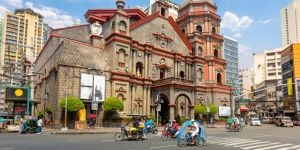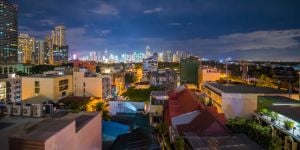Any Expat HAM Radio Operators?
Last activity 01 June 2023 by Enzyte Bob
589 Views
20 replies
Subscribe to the topic
Post new topic
Hi,
Am interested in HAM radio. How steep is the learning curve?
Back in VA along the coast, I have several boats with marine VHF radios, both fixed mount and handhelds for emergency communications, but if things went lights out here in the Philippines, it would be nice to communicate with the rest of the world.
Hello.
My name is Peter. I am from Mandurah Western Australia. My ham call sign is VK6 PBS. I am moving to Ormoc, Leyte to live. The entry level 'Foundation' License is easy as piss, but it limits you in the Philippines to 2 meters (VHF) low power. You might want to start there and then increase your levels and abilities through all 4 levels. Peter
moonunit0103 wrote:Hi,
Am interested in HAM radio. How steep is the learning curve?
Back in VA along the coast, I have several boats with marine VHF radios, both fixed mount and handhelds for emergency communications, but if things went lights out here in the Philippines, it would be nice to communicate with the rest of the world.
More information at https://www.para.org.ph/ Philippine Amateur Radio Association (PARA)
I'm W9XR extra class license. The Philippines has reciprocal licensing, but you would not get a Philippine call but a ***/ and then your call.
I don't quite under stand the procedures in the Philippines but when I received my license I had a tough technical examination and had to copy Morse code at 20 wpm.
Now it's dumb down so much it's easy to get an extra class license in he states.
I've lost interest here (Philippines) for many reasons, I don't relish starting the exam procedure all over (my age). Having to join and take classes from PARA to be able to take the exam.
You don't need the link from a previous post that is under review for PARA. Just google it. Also the difficulty in importing HF gear and accessories. It's easier to get a license in China and have they many radio outlets.
The ham world in the Philippines is the shack on the belt. Not my cup of tee, I enjoy cw, contesting, building antennas and hamfests.
If you are still in the USA you could study for and sit ham exams there. Then before going to the Philippines contact PARA for a reciprocal license. You must declare your rigs to customs and get an apparatus license as you would have for your Marine radios etc. *You need both) Details on the PARA web site.
Some people report problems dealing with Philippines authorities while others praise them. Personally, I have found them helpful both over the phone and by email.
if you want a higher class of license (4 levels in the Philippines) you need 5 words per minute Morse code send and receive. How the previous post was tested at 20 W.P.M I have no idea - unless he had attitude and pissed them off BIG time? I don't know?
Attitude in the Philippines (and some other South East Asian countries) wont get you anywhere. I know an Australian who moved to Malaysia and started raising his voice in a government office. They suddenly started talking in Malaysian to him instead of English. He called for the Supervisor who told him to come back once he had learnt Malaysian. (in other words dropped his attitude)
Bye-the-way. If you get an entry level Foundation license you can use Echo Link to chat to people through repeaters world wide, stateside and in VA. Meantime I am happy to catch up with you when I get to Ormoc.
Peter VK6 PBS
peterzapfella wrote:How the previous post was tested at 20 W.P.M I have no idea - unless he had attitude and pissed them off BIG time? I don't know?
Who would I have pissed off Big Time?
Peter what were the qualifications for your license grade?
Also what are you talking about, I am that previous poster. My first license was as a novice KN2MWK (USA) and to copy 5 wpm and a written test.
The next step was the Technician License, but I leaped head and took the General exam, I had to copy 13 wpm. In the written general exam you had to draw schematics of Colpitts and Hartly oscillator Circuits and answer technical questions.
The next was the advance license with a highly technical exam.
The final step I took was the extra class exam having to copy 20 wpm and another exam. The written exam consisted of some solid state questions. Which allowed me to turn in my old call sign W9DOB and chose a two letter call of my choosing (you had to be licensed 25 years) and I chose W9XR.
Each advancement in licenses allowed you more privileges back then, before they dumb down the qualifications
W9XR was a broadcast station that went off the air in 1933. I am the first and only amateur issued W9XR. I was one of the first to have a call in the "x" block. "X" calls were previously for experimental licenses while the radio spectrum development.
When in the states I operated 100% CW, the only SSB operations were during contests. I have given up about operating in the Philippine, one main reason was the availability of equipment and hardware in the Philippines.
You don't have ham radio stores in the Philippines like you did in Australia or in the US.
The last station I operated had a Rhon 165' self supporting tower. Also had a homebrew 3 el wide space yagi for 40 meters. One weekend on 40 meters worked over 1,000 dx stations in 133 countries in the CQ world wide contest.
In the early years I worked at Zenith Radio, Gottlieb Pinball Company, Wells Gardner Electronics, James Electronics and finally ended up at Motorola in the Communication Division.
WOW! I can see why the Philippines is soo frustrating for you. You have done the hard yards. I have heard from others that equipment is hard to find in the Philippines as no retail outlets exists, particularly for HF equipment.
Depending your QTH I can imagine QRM could be murder too. back in 1980 Melbourne radio 3AW asked me to go to Katmandu, Nepal to cover an Australian assault on Mount Everest. They had one of their leading journalists at base camp and wanted me to man the link to satellite in the city.
The HF/SSB link was about 3 megs. I said "it wont work. The QRM in Katmandu will drown out the signal from Mount Everest. I was not a ham then. I am not a tech - even now. What would I know?
I did not want to be responsible for what I saw as a no win situation so I recommended a mate who is a ham and a radio tech. I thought if anyone could make it work he could. So they sent him.
I have regretted doing that ever since because he could not get over the incredible QRM in Katmandu either. So he had to conduct the interview with the journalist, make notes then make out he was the journalist at Mount Everest for the link back to the Australian network.
I had a few friends who were hams so I was exposed to the hobby all the time. I picked up a lot but I could not learn Morse at the required level to get a license (10 WPM). Later Novice licenses became available (5 WPM) but I had already found new interests -I set up a commercial radio business.
I got right into commercial VHF and UHF networks and radio telephone links etc. Then I went farming and drifted further away from ham radio.
Just months ago I went to stay with one of my ham friends who tested me on the theory. It enthused me to have a go so I sat for the license and got 100%. In Australia they dumped CW as a license requirement, so I have decided to go all the way.
I am also interested in learning CW. To that end I have been researching how best to learn it. That has lead me to create a web page in the past couple of days
I am wondering if you might take a look at it and tell me how I can improve it. You have so much experience with CW, I am sure your feedback would be invaluable.
The page is at https://www.peterzapfella.com/product/w … orse-code/
I look forward to hearing back from you.
Also where in the Philippines is your QTH?
Peter
peterzapfella wrote:WOW! I can see why the Philippines is soo frustrating for you. You have done the hard yards. I have heard from others that equipment is hard to find in the Philippines as no retail outlets exists, particularly for HF equipment.
Depending your QTH I can imagine QRM could be murder too.
I am also interested in learning CW. To that end I have been researching how best to learn it. That has lead me to create a web page in the past couple of days
I am wondering if you might take a look at it and tell me how I can improve it. You have so much experience with CW, I am sure your feedback would be invaluable.
The page is at https://www.peterzapfella.com/product/w … orse-code/
I look forward to hearing back from you.
Also where in the Philippines is your QTH?
Peter
Peter, I visited your website and I'm very impressed by you.
The amazing thing about ham radio, it steered me into the field of electronics. It also taught me to work harder to achieve the income to have a first class station.
I learned morse/cw at a young age (13). That's an age that you have a good memory. I don't know your age, but if you're a senior I don't think it's possible.
Morse can be considered a language, it's a second language to me. My copying speed is about 40 wpm in my head, way to fast to put down on paper. If I was to learn morse at my age, it would have the same obstacles as learning Tagalog.
How I learned, I was fortunate enough to have a ham operator living next door to me. I was an swl before he moved in and knew nothing on how to become a ham or interested until I saw his shack. He was my Mentor/Elmer and explained what I had to do. First he had me learn my first name in morse. He loaned me a code practice oscillator and I spent hours sending my name, then my middle name and then my last name, so I learned 11 letters. Repetition of sending those letters. Then I added more letters. You have to practice sending the letters, even using a cheat sheet. Hours of sending, never mind trying to copy until you have hours of sending.
I was lucky that my Father encouraged me. I remember he was waiting outside school when my license arrived after six weeks of waiting. I already had a cw transmitter and I was just waiting for my license. For my first qso I had it scripted on paper and just sent what I had written down, shortly afterwards I was able to send from my thoughts.
Now way back then the US offered a novice license, 5 wpm and rules and regulations. The license allowed you to be crystal controlled and up to 75 watts licensed for CW. At the time the license was good for one year, non renewal. If you wanted to stay in the hobby you had to upgrade to General Class which was 13 wpm and some basic theory. For most Novices it was easy after operating cw for their ham experience.
The General Class offered all privileges and the holy grail, "phone privileges" for rag chewing. As you know ham radio has many hobbies and interests under the ham radio umbrella. I was interested in DX and radio sport contesting and this was easier done on cw.
Then some years later the FCC decided to change the rules and called it incentive licensing. They reduced the operating frequencies for generals. Now Dxing & radio sport contesting for me was severely restricted, so I had the incentive to upgrade. 20 wpm was no challenge for me considering almost all my operating was on cw.
Then years later the FCC went in the opposite direction, everything was dumb down including no code. Now when I think back on what I went through to achieve the Extra Class license years ago, now available like a coupon attached to a can of Fosters Beer.
The hobby is dying. When I was a youngster is was exciting to talk around the world from your bedroom. I think of my transmitter & receiver weighing maybe 70 Kilos together compared to a smart phone talking or messaging around the world.
My QTH is NCR, Pasig City. Impossible to put up an antenna, my house has no front, back or side yards.
Everyone on this Expat website would have no interest in what we are talking about, maybe we should take it private.
Spence
DU7SJF here in Valencia/Dumaguete. AI4QJ in the USA. If you have a foreign license and you move here, you can use a reciprocal license with your country for up to one year. After that you are expected to take a written test and a code test for Extra class. I have an HF and VHF station, mostly on CW and sometimes on SSB and of course VHF FM. They have 3 daily PARA nets on 7095 KHz. Propagation is improving now so there is improving DX on 15-20-40m. Not many people here on 160 or 80m. 12, 15 and 12 are also quite popular. Give me a shout if you move here. To get your license, join a local club so they can help you with a scheduled NTC exam and help you study for the test (the questions are 100% different than FCC and I believe some of the questions have incorrect answers lol). 73 es GL and HPE CU on the bands. Dan
My copying speed is about 40 wpm in my head, way to fast to put down on paper
Gosh - my absolute best on a good day didn't hit 20, and only really comfortable at 16 max if I was in the zone.
Fred wrote:My copying speed is about 40 wpm in my head, way to fast to put down on paper
Gosh - my absolute best on a good day didn't hit 20, and only really comfortable at 16 max if I was in the zone.
I used to stay around 16-18 but here in the PI you willl not find anybody to talk to becaue it is too slow, except perhaps the daily Phils cw net on 7102KHz or the Tokyo FISTS net on 20m. So, I increased to about 25 wpm head copy and 35 for contest exchanges.
I was always more interested in 15 and 20 rather than 40 and 80. I played a little on 40 but not all that much.
A girl fiend of the time was into showjumping so used the chance to toss a wire into the nearest tree and try a little CW QRP - got a few reasonable QSOs, including a VE from the UK on 10w rms.
My FT 70g was a little cracker
PS - Yes, the post was in English 
Fred wrote:My copying speed is about 40 wpm in my head, way to fast to put down on paper
Gosh - my absolute best on a good day didn't hit 20, and only really comfortable at 16 max if I was in the zone.
Surprising enough in the DX contests Indonesia is well represented compared to other SE Asian countries, Japan has the most activity.
40 meters was my favorite band, with a 3 el full size yagi 50 meters high, at 3 pm (daylight) was able to work into Europe.
How hard is it to buy gear and accessories in Indonesia? Did you do any operating in Indonesia or only in the UK?
danfinn wrote:DU7SJF here in Valencia/Dumaguete. AI4QJ in the USA. If you have a foreign license and you move here, you can use a reciprocal license with your country for up to one year. After that you are expected to take a written test and a code test for Extra class. I have an HF and VHF station, mostly on CW and sometimes on SSB and of course VHF FM. They have 3 daily PARA nets on 7095 KHz. Propagation is improving now so there is improving DX on 15-20-40m. Not many people here on 160 or 80m. 12, 15 and 12 are also quite popular. Give me a shout if you move here. To get your license, join a local club so they can help you with a scheduled NTC exam and help you study for the test (the questions are 100% different than FCC and I believe some of the questions have incorrect answers lol). 73 es GL and HPE CU on the bands. Dan
I viewed your station on QRZ . . .very nice. Two questions for you: (1) How hard was the examination on the top tier? Due to my age I don't get around well so joining a local club would be very difficult. (2) Did you have any problems inporting HF gear?
The only equipment I brought with me are two AEA MM-3 Morse machines.
W9XR
@moonunit0103 yes am a American who is a ham here in the Philippines
@moonunit0103 yes am a American who is a ham here in the Philippines
-@Scott Mandel
CQ DX . . . .Whiskey Nine Xray Radio
Hey Scott Mandel,
Welcome to Expat.com
Feel free to tell us more about yourself, please.
Thank you,
Cheryl
Expat.com team
@moonunit0103 yes am a American who is a ham here in the Philippines
-@Scott Mandel
CQ DX . . . .Whiskey Nine Xray Radio
-@Enzyte Bob
Do you get on HF such as 40m etc.? Maybe not as I think you are in a condo. I have been a regular on the 40m DU net AM and PM. I have VHF but hardly ever use it. I did get a DU callsign and have 2 stations, one in Valencia (Dumaguete) and another in Siquijor.
Enzyte Bob said....CQ DX . . . .Whiskey Nine Xray Radio
********************************************
danfinn replied. . . . . Do you get on HF such as 40m etc.? Maybe not as I think you are in a condo. I have been a regular on the 40m DU net AM and PM. I have VHF but hardly ever use it. I did get a DU callsign and have 2 stations, one in Valencia (Dumaguete) and another in Siquijor.
********************************
Since coming to the Philippines in 2018 ham radio has been on the back burner.
I have an extra class license and at the time you had to take a 20 wpm code test, easily passed by me as I'm a 100% cw operator except in contests, I'll plug the mike in. Over the years in the states I was a serious contest operator.
My passion is contesting and antenna design and building. I'm landlocked here in Pasig City, our house uses every square inch of land and no access to the roof.
I would like to have a station, quiet receiving location and a DU call sign. I have given up, as I understand it I would have to take the written test over, I'm still knowledgeable but physically unable to get around so it would be a chore to attend classes or take the test. One walking trip around S&R or Landers is my limit.
Also it would be a hassle importing radio's.
I have designs for 40 meter Bobtail Curtains and Half Square antennas that are cheap to build and would give you gain.
Also I have designs for a 3 & 4 element 40 meter OWA, Moxon beams that has 12.4 dbi gain.
@Enzyte Bob Hey Bob, my posts in this group some where this evening.
What's the quickest , hassle free way to get a reciprical license there in PH, how long does it take?
I'm a full license A class holder ,all modes all bands since 1985, worked as A24SC back in 85,then G0BAU/C6A.
Live in Philippines 5 months of the year Pampanga, have property there, but want to re ignite the hobby after 20 years collecting dust.
Is it a case of turning up to licencing Authority and filling forms out? And can you bring equipment in before you get your licence? Don't want the hassle of resitting the exam more of a / suffixe would suffice.
Coming across in 6 weeks time but only for 3 weeks so hoping to get the ball rolling ready for March/April 2024.
Appreciate any help
73 G0BAU
@Enzyte Bob Hey Bob, my posts in this group some where this evening.
What's the quickest , hassle free way to get a reciprical license there in PH, how long does it take?
I'm a full license A class holder ,all modes all bands since 1985, worked as A24SC back in 85,then G0BAU/C6A.
Live in Philippines 5 months of the year Pampanga, have property there, but want to re ignite the hobby after 20 years collecting dust.
Is it a case of turning up to licencing Authority and filling forms out? And can you bring equipment in before you get your licence? Don't want the hassle of resitting the exam more of a / suffixe would suffice.
Coming across in 6 weeks time but only for 3 weeks so hoping to get the ball rolling ready for March/April 2024.
Appreciate any help
73 G0BAU
-@G0BAU
********************************************************
I can't be of much help on that. There are many hams on this forum, some even have a licenses and stations, so they would be best qualified to answer your questions and point you in the right direction.
I think all roads lead through (PARA) Philippine Amateur Radio Association. It took several emails to them to get a response. It has been recommended to me to join making life simpler for licensing and importing gear.
There is such a lack of activity in international radio contests from the Philippines. Per example a station in the USA made 14,000 qso's in the CQ Worldwide Contest. . . . only 6 or 8 were from the Philippines.
Articles to help you in your expat project in the Philippines
 Lifestyle in the Philippines
Lifestyle in the PhilippinesAbout to move to the Philippines? Wondering how you're going to adapt to your new environment and lifestyle? ...
 Getting married in the Philippines
Getting married in the PhilippinesGetting married in the Philippines provides a backdrop of immense beauty through stunning beaches, tropical ...
 Dating in the Philippines
Dating in the PhilippinesThe beauty of the Philippines, with its dramatic modern and old Spanish architecture, plus the golden sands and ...
 Obtaining a Philippines driving licence
Obtaining a Philippines driving licenceWhether you are converting your existing foreign driving license or applying as a first-timer for a Philippines ...
 Leisure activities in the Philippines
Leisure activities in the PhilippinesConsisting of more than 7,000 islands, the Philippines is a real treasure that you can explore during your stay ...
 Choosing your neighbourhood in Manila
Choosing your neighbourhood in ManilaChoosing a neighborhood is one of the most critical decisions that expats need to make when moving to Manila. Each ...
 Phones and Internet in the Philippines
Phones and Internet in the PhilippinesWhen moving to the Philippines, the first ‘essentials' is telecommunications; Getting a local sim card and ...
 Diversity and inclusion in the Philippines
Diversity and inclusion in the PhilippinesThe culture of the Philippines is very diverse. This is due to the large mix of different nations in this country, ...
Find more topics on the Philippines forum



